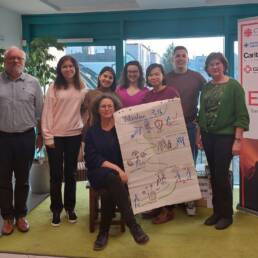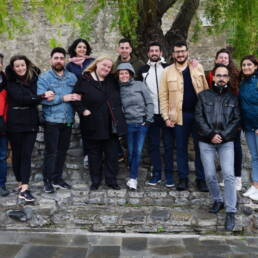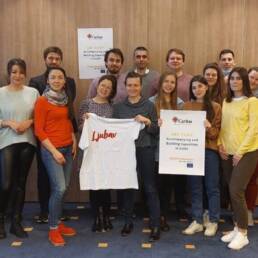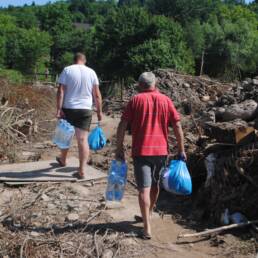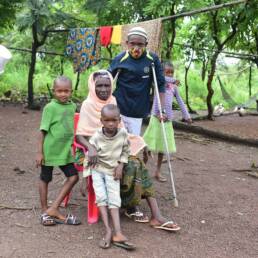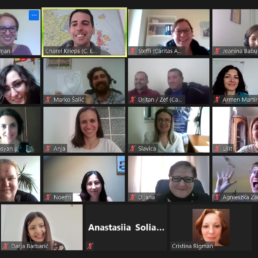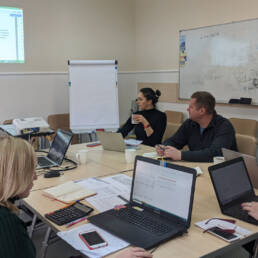Author
Charel Krieps
Humanitarian Officer
Caritas Europa
Despite the ongoing war, the two national Caritas organisations in Ukraine, Caritas-Spes and Caritas Ukraine, continue to improve the safety and well-being of the communities they serve as well as of their staff and volunteers.
Safeguarding is the duty of organisations to ensure their staff, operations and programmes do not cause any harm to anyone, especially to children and vulnerable adults. In times of conflict and emergency, this duty is ever more important.
Training for a safe environment
Safeguarding starts with policies detailing which behaviour is appropriate and which is not. But it doesn’t end there. Staff, volunteers and communities need to be made aware of these policies. Caritas-Spes has prioritised comprehensive training programmes for its staff members and volunteers. Over the past year, more than 400 individuals have received training on the organisation’s safeguarding policies, thereby equipping them with the necessary knowledge and tools to create a safe environment for all stakeholders.
The training initiatives are adapted to the level of responsibility of each person and include specialised sessions for psychologists and for staff members of camps for internally displaced people.
Caritas Ukraine has rolled out additional training for hotline operators and project managers and even trained dedicated staff on how to investigate alleged misconduct. This multifaceted approach ensures that each participant receives tailored training, addressing the unique challenges they may encounter in their respective roles.
Strengthening complaints handling
Policies and trainings are not always sufficient in preventing harm. When harm does occur, individuals have a right to complain and provide other feedback in a safe and confident manner. Such a “complaints handling mechanism” is essential for each Caritas to receive and address complaints – and most importantly to improve its work. Caritas-Spes is in the process of reviewing its mechanism by using feedback from the communities it serves to increase the mechanism’s efficiency and responsiveness.
Any complaints handling mechanism needs to be adapted to the local realities. For this reason, Caritas Ukraine appointed dedicated safeguarding focal points in all 43 of its local organisations. It is important that the local communities are aware about what behaviour a Caritas worker should and should not adopt and that they have the possibility and the right to contact Caritas if they witness misconduct. The best way for this information to reach the local community is by coming from the local Caritas organisation that knows the local realities.
In addition, both organisations established hotlines through which individuals receiving support can submit feedback and complaints. Caritas-Spes, for example, receives thousands of calls per months through these hotlines!
Referrals and whistleblowing
If a safeguarding violation occurs and Caritas itself is not able to provide support, it will refer the individual to competent third partners. Caritas Ukraine set up such a referral system to cover physical and psychological healthcare, protection services, shelter providers and legal support. Needless to say, referrals only take place with the consent of the person to be referred.
Even within the organisation, Caritas workers have a right to alert about things heading in the wrong direction. Recognising the importance of fostering a culture of transparency, Caritas-Spes has adopted a draft whistleblower policy. This policy serves as an additional safeguarding measure, encouraging individuals to come forward with any information related to misconduct, fraud or unethical behaviour.
Collaborating with others
In addition, Caritas Ukraine and Caritas-Spes are demonstrating their commitment to safeguarding at a broader level as active members of the UN Protection Cluster in Ukraine. This and other collaborations enable Caritas to align its efforts with international standards and work alongside other stakeholders to address protection challenges effectively. By sharing knowledge and expertise with partners, Caritas contributes to a collective response aimed at safeguarding the most vulnerable populations during times of crisis.
Despite the challenging circumstances posed by the ongoing war, Caritas-Spes and Caritas Ukraine are determined to continue their professional efforts in ensuring a secure environment and the overall well-being of both those in need and their dedicated staff and volunteeres.


